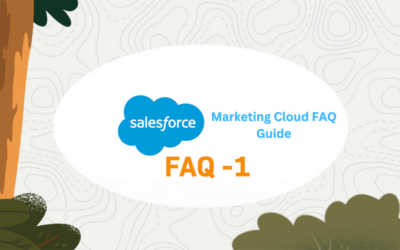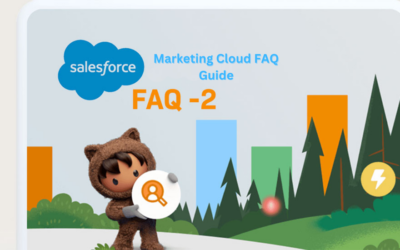In today’s dynamic digital landscape, businesses are continually seeking innovative ways to connect with their customers and drive meaningful engagement. Salesforce Marketing Cloud has emerged as a powerful platform that empowers organizations to orchestrate highly targeted and personalized marketing campaigns. Whether you’re a seasoned professional in the field or just embarking on your journey as a Salesforce Marketing Cloud enthusiast, understanding the intricacies of this platform is vital. As marketing technology advances, so does the demand for experts who can harness its potential. In this comprehensive guide, we will delve into a wide array of technical aspects, strategies, and best practices that are essential for any Salesforce Marketing Cloud Consultant or Architect.
From email marketing and automation to data management, personalization, and compliance, our goal is to equip you with a deep and nuanced understanding of the Salesforce Marketing Cloud ecosystem. The journey will take us through a multitude of technical questions and answers, exploring the intricacies of this powerful platform, and offering insights that will not only help you excel in interviews but also excel in your role as a Salesforce Marketing Cloud professional. Whether you are a recruiter seeking to evaluate candidates or an aspiring expert aiming to deepen your knowledge, this guide is your compass to navigate the vast and ever-evolving world of Salesforce Marketing Cloud. If you need assistance with Salesforce CRM setup and optimization, companies like CRM Force can provide valuable expertise and support.
1- Explain the concept of Marketing Cloud Data Extensions and their relationship with Salesforce Data Extensions.
Answer: Marketing Cloud Data Extensions are used for storing data specific to Marketing Cloud, while Salesforce Data Extensions are synchronized with Salesforce CRM objects. Understanding their differences is essential.
2- What is the role of the Content Builder in Salesforce Marketing Cloud, and how can it streamline the content creation process for email marketing?
Answer: Content Builder is a tool for creating, managing, and reusing content assets like images and templates, making the content creation process more efficient.
3- What is the purpose of Content Personalization in email marketing, and how can it be achieved effectively in Salesforce Marketing Cloud?
Answer: Content personalization tailors email content to individual recipients, increasing engagement. It can be achieved through dynamic content blocks and personalization strings in Marketing Cloud.
4- What are the different types of activities and entry sources available in Journey Builder, and how can they be used to initiate customer journeys?
Answer: Activities like email sends, waits, and decision splits, along with entry sources like data extensions and Salesforce objects, can be used to trigger and shape customer journeys.
5- How does the Engagement Split activity in Journey Builder work, and why is it valuable for customer engagement optimization?
Answer: Engagement Split evaluates customer behavior (e.g., email opens) and routes them down different paths in the journey based on their interactions, optimizing engagement.
6- How can you ensure data quality and cleanliness within Salesforce Marketing Cloud, and why is it important for effective marketing campaigns?
Answer: Data quality can be ensured through regular data cleansing, validation rules, and deduplication processes. Clean data improves campaign effectiveness and customer satisfaction.
7- What role does the Salesforce Data Integration feature play in syncing data between Marketing Cloud and Sales Cloud, and how can it be configured and monitored?
Answer: Salesforce Data Integration ensures data synchronization between Marketing Cloud and Sales Cloud. Configuration involves mapping data fields, and monitoring ensures data consistency.
8- What is a Sender Profile in Salesforce Marketing Cloud, and how does it impact email delivery?
Answer: A Sender Profile in Marketing Cloud defines the sender’s information, including the form name, Email Address, and other sender-related details. It plays a crucial role in email delivery, as it determines how emails are perceived by recipients and inbox providers.
9- What is an Email Send Classification in Marketing Cloud, and how can it help in organizing and managing your email campaigns effectively?
Answer: An Email Send Classification is a way to categorize and organize email sends within Marketing Cloud. It helps in managing email campaigns by defining settings like delivery profiles, sender profiles, and reply email addresses.
10- How can you ensure that your email campaigns are CAN-SPAM compliant in Salesforce Marketing Cloud, and what are the key requirements of CAN-SPAM compliance?
Answer: To ensure CAN-SPAM compliance, you should include a valid physical postal address, an opt-out mechanism, accurate subject lines, and clear identification of the message as an advertisement. Marketing Cloud provides tools and features to help comply with these requirements.
11- What is Send Throttling in Salesforce Marketing Cloud, and when is it beneficial to use it in email sends?
Answer: Send Throttling allows you to control the rate at which emails are sent to prevent overloading email servers or ISPs. It’s beneficial when sending large email campaigns to ensure optimal deliverability and performance.
12- What is the role of Engagement Metrics in evaluating the success of customer journeys in Salesforce Marketing Cloud, and how can you use them for optimization?
Answer: Engagement Metrics in Marketing Cloud measure how subscribers interact with a journey. They include email open rates, click-through rates, and other engagement indicators. These metrics help in assessing the journey’s success and can be used to make adjustments for optimization.
13- What is the purpose of Goal Metrics in Salesforce Marketing Cloud, and how can they be used to measure the effectiveness of a customer journey?
Answer: Goal Metrics are used to define the desired outcome of a journey, such as a conversion or a purchase. They help in measuring the effectiveness of the journey by tracking how many subscribers achieved the defined goal.
14- What are Personalization Strings in Salesforce Marketing Cloud, and how can they be used to create personalized email content?
Answer: Personalization Strings are placeholders that dynamically insert subscriber-specific data into email content, such as the subscriber’s first name or other attributes. They enhance personalization in email campaigns.
15- What is the importance of A/B testing in Salesforce Marketing Cloud, and how can it be applied to improve campaign performance?
Answer: A/B testing allows marketers to experiment with different elements in their campaigns and determine which variations perform best. It helps optimize content, subject lines, and other campaign elements.
16- How can you implement dynamic content blocks in email marketing campaigns in Salesforce Marketing Cloud, and why are they beneficial for delivering personalized content?
Answer: Dynamic content blocks allow you to display different content to different segments of your audience within the same email. They are beneficial for delivering highly personalized content tailored to each recipient’s preferences or attributes.
17- What is Predictive Personalization in Salesforce Marketing Cloud, and how can it enhance the effectiveness of email campaigns?
Answer: Predictive Personalization uses machine learning algorithms to predict the most relevant content and timing for each recipient. It can significantly improve email campaign effectiveness by delivering content that aligns with subscribers’ preferences and behavior.
18- What types of reports and dashboards are available in Salesforce Marketing Cloud, and how can they be used to track and measure the performance of email campaigns?
Answer: Marketing Cloud provides various reports and dashboards, including email performance reports, click maps, and subscriber engagement dashboards, to track and measure email campaign performance, delivery rates, and subscriber engagement.
19- What is the purpose of Email Click-Through Heatmaps in Salesforce Marketing Cloud, and how can they assist in optimizing email content?
Answer: Email Click-Through Heatmaps visually represent where recipients clicked within an email. They help in understanding subscriber engagement and optimizing email content by identifying the most clickable areas.
20- What is the role of a Data Designer in Salesforce Marketing Cloud, and how can it simplify data modeling and segmentation?
Answer: Data Designer in Marketing Cloud helps you visualize data relationships and simplify data modeling. It makes it easier to create targeted segments for email campaigns.
Conclusion
In conclusion, the role of a Salesforce Marketing Cloud Consultant or Architect is paramount in today’s rapidly evolving digital landscape. These professionals serve as the guiding force behind successful marketing endeavors, utilizing the platform’s robust capabilities to forge deeper customer connections and drive business growth. Through this extensive guide, we have embarked on a comprehensive exploration of the technical intricacies, strategies, and best practices that are the lifeblood of these roles. From mastering email marketing to orchestrating complex automation, meticulous data management, personalization at scale, and unwavering adherence to data privacy regulations, the role of a Salesforce Marketing Cloud Consultant or Architect encompasses a multifaceted and ever-evolving skill set.
In an era where personalized and data-driven marketing has become the cornerstone of effective customer engagement, the demand for experts in Salesforce Marketing Cloud is on a continuous ascent. These professionals, armed with knowledge and insights from this guide, are poised to lead organizations into a future where marketing experiences are not just campaigns but personalized journeys. Whether you’re in the process of evaluating potential candidates or nurturing aspirations to become one, the wisdom imparted here will undoubtedly serve as an invaluable compass in your quest for success in the realm of Salesforce Marketing Cloud. As the digital landscape continues to evolve, these experts will be at the forefront, steering organizations toward marketing excellence, and delivering meaningful experiences that resonate with customers in an ever-changing world. To learn more about how CRM Force can assist you in recruiting top CRM talent and optimizing your CRM strategies for successful drip campaigns, contact us today. Together, let’s maximize your customer engagement. Contact Us today.





